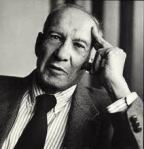Management (noun):
the act or skill of controlling and making decisions about a business, department, sports team, etc.
the people who make decisions about a business, department, sports team, etc.
the act or process of deciding how to use something
——————–
The more you tackle “knowledge work,” the more you work in the realm of ideas, the farther you get from having a traditional manager. A manager is that person who tells you exactly what to do, exactly when to do this, exactly where to do it… The manager directs your every action.
And, in the past, a lot of jobs were done with more efficiency, greater productivity, because of the fine work done by managers. Today, many still are. But increasingly, we are in a “I have to manage my own work” world. Today, many, many more of us are functioning without some such directive voice. {Partly because of our work with ideas/knowledge/information).
Thus, we have to become our own managers.

It took Peter Drucker just a few sentences to get to the heart of the matter in his essay: Managing Oneself. Here is the key excerpt.
Companies today aren’t managing their employees’ careers; knowledge workers must, effectively, be their own chief executive officers. It’s up to you to carve out your place, to know when to change course, and to keep yourself engaged and productive during a work life that may span some 50 years. To do those things well, you’ll need to cultivate a deep understanding of yourself—not only what your strengths and weaknesses are but also how you learn, how you work with others, what your values are, and where you can make the greatest contribution. Because only when you operate from strengths can you achieve true excellence.
History’s great achievers—a Napoléon, a da Vinci, a Mozart—have always managed themselves. That, in large measure, is what makes them great achievers. But they are rare exceptions, so unusual both in their talents and their accomplishments as to be considered outside the boundaries of ordinary human existence. Now, most of us, even those of us with modest endowments, will have to learn to manage ourselves. We will have to learn to develop ourselves. We will have to place ourselves where we can make the greatest contribution. And we will have to stay mentally alert and engaged during a 50-year working life, which means knowing how and when to change the work we do.
I while back, I wrote a blog post asking this question: Which is It? Overmanaged and Underled — OR, Undermanaged and Overled? How about Undermanaged and Underled? I said then, and still say, that these are pretty equal problems. We are both undermanaged and underled.
I think the challenge is this – invest some time in managing your own work. Decide, in advance, what you need to be doing, when you will do it, and then develop a path to follow to get that work done.
Here are five questions that Peter Drucker raised in this essay, to help you manage yourself effectively:
• What are my strengths?
• How do I perform?
• What are my values?
• Where do I belong?
• What should I contribute?
Let’s add a sixth, hinted at by Mr. Drucker’s line: And we will have to stay mentally alert and engaged during a 50-year working life, which means knowing how and when to change the work we do.
• How will I next change the way I work?
Because, you will change the way you work – again – before you know it.
So, add this to your ever growing list of understandings about how you work: you have to learn to better manage yourself. Because a better managed you is a more productive, more successful you.
